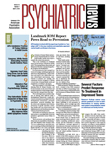The U.S. Department of Justice has accused Forest Laboratories of conducting a “fraudulent scheme to market and promote” unapproved indications for its antidepressants citalopram and escitalopram and paying kickbacks to induce physicians to prescribe those medications.
The civil suit, which was filed February 13 in the U.S. District Court for the District of Massachusetts, alleges that Forest Laboratories and its subsidiary, Forest Pharmaceuticals, violated the federal False Claims Act and engaged in “illegal marketing schemes” to promote the use of citalopram (Celexa) and escitalopram (Lexapro) for treating pediatric patients, even though the drugs are not approved by the Food and Drug Administration (FDA) for this population. The suit charges that the company disseminated “false and misleading information to doctors and the public about the safety and efficacy of Celexa and Lexapro in treating pediatric patients.”
(At press time, the Food and Drug Administration approved Lexapro for the treatment of depression in adolescents. Details will appear in a future issue.)
One of the complaints involved two large, randomized, placebo-controlled clinical trials of pediatric depression treatment with citalopram that were conducted in 1999 as part of Forest's application for expanding citalopram's indication to include pediatric use. One of the trials was conducted in Europe by Lundbeck, the Denmark-based manufacturer that owns rights to the medications in Europe, and the other was conducted in the United States by Karen Wagner, M.D., Ph.D., the Robert L. Stubblefield Professor and vice chair of the Department of Psychiatry and Behavioral Sciences at the University of Texas Medical Branch in Galveston and director of its Division of Child and Adolescent Psychiatry.
The Lundbeck study produced negative results, showing that citalopram was not significantly more effective than placebo in treating pediatric depression. It also suggested an increase in the risk of suicidal thoughts and behaviors in the citalopram-treated patients compared with those on placebo.
The Wagner study, however, demonstrated that citalopram was significantly more efficacious than placebo in pediatric patients. Data from both studies were submitted to the FDA in 2002, and the agency denied the application for citalopram's pediatric indication.
The lawsuit accuses Forest of disseminating “half truths” in that it “aggressively promoted” the Wagner study while suppressing the negative Lundbeck study from the public and psychiatrists and others who might prescribe the drug. Without naming specific people, the complaint stated that the company's “Executive Advisory Board of leading psychiatrists” was presented with the Wagner study results without any mention of the negative Lundbeck study.
The Wagner study was published in the June 2004 American Journal of Psychiatry (AJP) with no mention of the Lundbeck study. In addition, Forest arranged for Wagner to give a series of presentations to professional groups, including APA and the American College of Neuropsychopharmacology, and continuing medical education programs to discuss her study of citalopram's effectiveness in pediatric depression.
Meanwhile, the Lundbeck study was unknown to Wagner, the psychiatrists on Forest's advisory board, the medical community, AJP, and the public. They asserted that only a few senior executives of the company and the FDA had full access to the Lundbeck study results. Allegedly, even Forest's own sales representatives and Professional Affairs Department (which is responsible for answering medication-information inquiries from physicians and the public) were not given information on the Lundbeck study results. Thus prescribers, payers, patients, and the public were misled with only information favorable to citalopram use in children without knowing about the unfavorable safety and efficacy data, according to the government.
“From 1998 through at least 2005, Forest engaged in a widespread campaign to promote Celexa and Lexapro for pediatric use” and violated the federal antikickback statute, the government alleges. To induce physicians to prescribe both drugs for more pediatric patients and more patients in general, Forest directed sales representatives to target specific physicians in certain U.S. regions, including “thousands of child psychiatrists, pediatricians, and other physicians who specialized in treating children,” the lawsuit says, citing company internal memos.
Among other accusations, the complaint maintains that Forest gave“ extensive payments and gifts to physicians to induce them to prescribe Celexa and Lexapro.” The kickbacks were provided as honoraria for thousands of physicians who participated in hundreds of advisory board meetings and clinical trials, as well as in the form of gifts, travel,“ lavish entertainment,” and grants to individual physicians.
The government is seeking to recover from Forest treble damages and penalties attributable to what the alleged marketing and other violations had cost Medicaid and the TRICARE program for the military and veterans.
On February 26, Forest Laboratories released a statement in response to the lawsuit indicating that the company is “continuing its discussions with the government about the investigation” and is “reviewing the complaint and will respond to this action at the appropriate time.” The statement also asserted that “off-label promotion and improper payments to medical providers have consistently been against [company] policy.”
[United States and Christopher R. Gobble v. Forest Laboratories Inc. and Forest Pharmaceuticals Inc. Civil Action No. 03-10395-NMG]
The complaint is posted at<online.wsj.com/public/resources/documents/lexapro.pdf>.▪
